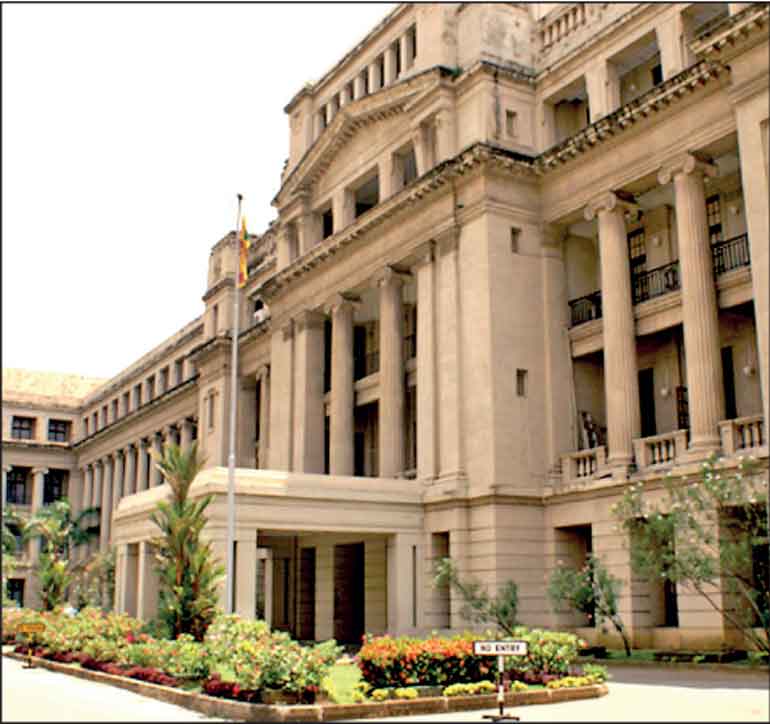Wednesday Feb 25, 2026
Wednesday Feb 25, 2026
Saturday, 28 December 2024 00:30 - - {{hitsCtrl.values.hits}}

By Ashwin Hemmathagama
in New York
The United States District Court for the Southern District of New York has granted a motion to extend the stay of litigation between Hamilton Reserve Bank (HRB) and the Democratic Socialist Republic of Sri Lanka for the fourth time, pushing the suspension of proceedings to 15 January, 2025. This decision, issued by District Judge Denise Cote, underscores the complex interplay of legal, economic, and diplomatic factors shaping the resolution of Sri Lanka’s sovereign debt crisis.
Sri Lanka’s economic turmoil, precipitating by a sovereign default in May 2022, led to a protracted restructuring process to address its unsustainable debt obligations. The crisis, described as one of the worst in the nation’s history, prompted Sri Lanka to seek an Extended Fund Facility (EFF) from the International Monetary Fund (IMF) amounting to $ 2.9 billion, approved in March 2023. The facility’s terms mandated significant reforms and negotiations with sovereign and private creditors.
Progress in restructuring was marked by key milestones in 2024: a memorandum of understanding with the Official Creditor Committee (OCC) in June, a debt restructuring agreement with the Export-Import Bank of China, and an agreement in principle with an ad hoc bondholder group of private commercial creditors in September. In November, Sri Lanka formally launched a debt exchange process, culminating on 12 December. Reports suggest that over 95% of bondholders, excluding HRB, participated in the exchange, marking a significant step toward economic stabilisation.
Hamilton Reserve Bank, the plaintiff in the case, holds over $ 240 million in principal amount of Sri Lanka’s sovereign bonds due in July 2022. Unlike most creditors, HRB has refrained from engaging in restructuring discussions, insisting on its legal claims for principal and accrued interest. Initially filed in June 2022, the case has seen successive extensions of stays to facilitate Sri Lanka’s negotiations with creditors. The latest motion to extend, filed on 26 November, 2024, sought a 45-day stay until 15 January, 2025. In her ruling, Judge Cote emphasised that the stay aligns with ongoing efforts to finalise the restructuring process, which is integral to Sri Lanka’s recovery plan under the IMF-supported program.
HRB’s submission on 11 December acknowledged Sri Lanka’s significant progress in restructuring but maintained that the litigation’s resolution remains unaffected by the broader process. Despite consenting to a brief extension until 12 December, HRB opposed further delays, arguing that the restructuring’s completion has minimal bearing on its specific claims.
Granting the motion nunc pro tunc, Judge Cote underscored the following considerations: progress toward restructuring, the restructuring’s near-finalisation marked by high participation in the debt exchange, supports continued judicial deference to facilitate resolution without disruption. Prejudice to the plaintiff, the judge noted HRB’s acknowledgment that the restructuring does not materially affect its claims. Any potential judgment in HRB’s favour would include pre-judgment interest, mitigating any delay-related prejudice. In a broader economic and diplomatic context, the court acknowledged the delicate balance between creditor claims and Sri Lanka’s efforts to restore economic stability. A premature resumption of litigation could jeopardise ongoing recovery efforts and deter other creditors from constructive engagement.
Until 15 January, 2025, the extension ensures Sri Lanka’s uninterrupted focus on concluding its restructuring program. By granting this stay, the court has effectively allowed the government additional time to implement the outcomes of the debt exchange and settle outstanding procedural matters. For HRB, the ruling underscores the challenges of litigating sovereign debt cases amid global economic crises. While HRB’s claims remain valid, the broader restructuring dynamics suggest that courts may prioritise systemic stability over individual creditor interests in such scenarios.
According to analysts, Sri Lanka will provide a status report by 6 January, 2025, outlining the restructuring’s completion. The settlement of the debt exchange, anticipated before or on 15 January, will mark a critical juncture in Sri Lanka’s recovery trajectory. Domestically, the successful resolution of the crisis is vital for stabilising public finances, creating fiscal space for growth, and restoring confidence among international stakeholders. However, allegations of inefficiency and corruption continue to cast shadows over the Government’s ability to deliver sustainable reforms.
From a global perspective, this case sets a significant precedent for handling sovereign debt disputes. The court’s deference to restructuring efforts highlights the growing recognition of the interconnectedness between legal judgments and broader economic imperatives. For policymakers, the outcome reinforces the importance of collaborative approaches to resolving debt crises, balancing creditor rights with the necessity of economic recovery.
The court’s decision to extend the stay reflects the complexities of resolving sovereign debt disputes in an interconnected global economy. As Sri Lanka navigates its path toward stability, the implications of this case will resonate across financial and legal domains, shaping the future of international debt restructuring frameworks. For HRB and other stakeholders, January 2025 will be decisive in determining the case’s trajectory and the broader lessons it imparts for managing sovereign defaults.